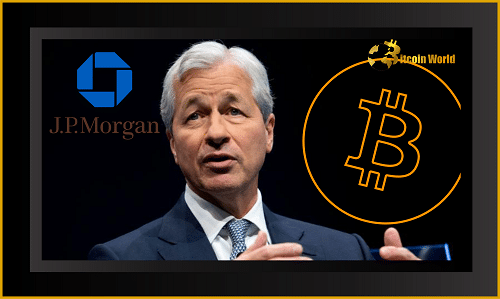The financial world is buzzing with the Federal Reserve’s latest move – a clear signal of rising interest rates to combat soaring inflation. In the midst of this economic shift, JPMorgan Chase, a leading financial institution, is advising investors to rethink their strategies. Specifically, they’re suggesting a move away from the short-term market noise and a sharper focus on asset valuations. But what does this mean for your crypto portfolio?
Why JPMorgan Says ‘Sell Crypto’ Amidst Hawkish Fed?
Last Friday, Federal Reserve Chairman Jerome Powell delivered a straightforward message: expect continued interest rate hikes and their sustained presence for a considerable period. This stance signals a strong commitment to quantitative tightening, effectively ending the era of ‘easy money’ that has characterized markets for some time. Many analysts interpret the Fed’s aggressive approach as a potential precursor to a U.S. recession. So, where does cryptocurrency fit into this picture?
David Kelly, the Chief Global Strategist at JPMorgan Asset Management, recently advised investors to prioritize valuations and reduce exposure to speculative investments. His advice is clear: steer clear of assets like cryptocurrencies in the face of the Fed’s hawkish policies.
Value Over Growth: A Shift in Investment Strategy
Kelly emphasizes a significant shift in market dynamics. He believes value stocks are poised to regain prominence. This means investors should consider pivoting away from growth-oriented stocks, which have been market favorites for years. His recommendation is quite direct: sell Bitcoin and other cryptocurrencies. He also suggests caution towards large-cap technology stocks, which are often considered growth stocks.
To understand this advice, it’s helpful to differentiate between value and growth stocks:
| Feature | Value Stocks | Growth Stocks |
|---|---|---|
| Valuation | Undervalued by the market, trading at a lower price relative to fundamentals (earnings, book value) | High growth potential, often trading at higher prices relative to current earnings |
| Earnings | Stable, consistent earnings, often from established companies | Earnings expected to grow rapidly in the future |
| Risk Profile | Generally considered less risky | Generally considered more risky due to dependence on future growth |
| Performance in Rising Rate Environment | Historically tend to outperform as future earnings are discounted less | Can underperform as higher rates reduce the present value of future earnings |
In essence, during periods of rising interest rates, the attractiveness of growth stocks diminishes as the present value of their future earnings is reduced. Conversely, value stocks, being less reliant on future growth and often paying dividends, can become more appealing.
Bitcoin’s Wild Ride: A Rollercoaster Year
The year 2023 has indeed been a tumultuous one for Bitcoin and the broader cryptocurrency market. The second quarter witnessed a significant market correction, exacerbated by excessive leverage within the crypto space and a subsequent liquidity crunch. This volatility underscores the inherent risks associated with cryptocurrencies, especially in uncertain economic climates.
Starting in July, there was a period of renewed optimism, with Bitcoin and other cryptocurrencies gaining upward momentum. However, this rally proved short-lived. The Fed’s recent announcements triggered a sharp market retracement, wiping out some of those gains. Kelly anticipates continued volatility and believes the risk of a recession is substantial, adding further uncertainty to the crypto outlook.
Looking Ahead: Recession Risks and Economic Normalcy?
While acknowledging the current economic headwinds, Kelly projects a return to a more normal economic environment by the end of 2023. Interestingly, he suggests that the Federal Reserve might be overestimating the underlying strength of the U.S. economy. He posits that their current hawkish stance could be partly driven by a desire to rectify past perceptions of being slow to react to rising inflation.
What Does This Mean for Crypto Traders?
JPMorgan’s advice, spearheaded by David Kelly, presents a cautious outlook for cryptocurrencies in the current macroeconomic environment. The core message is to prioritize value investments and reduce exposure to speculative assets like Bitcoin and other cryptos as the Federal Reserve tightens monetary policy. Here’s a quick recap of key takeaways:
- Hawkish Fed: Expect continued interest rate hikes and quantitative tightening from the Federal Reserve.
- Recession Risk: The Fed’s actions increase the probability of a U.S. recession.
- Value over Growth: Shift investment focus from growth stocks to value stocks.
- Sell Crypto: JPMorgan advises selling Bitcoin and other cryptocurrencies due to their speculative nature in a rising rate environment.
- Volatility Expected: Anticipate continued volatility in the cryptocurrency market.
- Long-Term View: JPMorgan predicts a return to economic normalcy by the end of 2023, but short-term turbulence is expected.
Ultimately, investment decisions should align with individual risk tolerance and financial goals. However, JPMorgan’s perspective offers valuable insights into how major financial institutions are interpreting the current economic landscape and positioning themselves – and advising their clients – accordingly. For crypto traders, this advice serves as a crucial point to consider amidst market uncertainties and potential economic shifts.
Disclaimer: The information provided is not trading advice, Bitcoinworld.co.in holds no liability for any investments made based on the information provided on this page. We strongly recommend independent research and/or consultation with a qualified professional before making any investment decisions.


